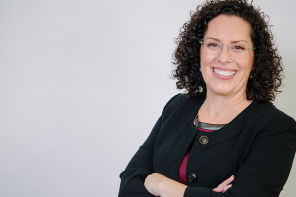By Holly Henschen
The Forensic Nursing Program at Meriter Hospital is Dane County’s only nursing program designed to collect evidence from and treat victims of physical and sexual assault, and child abuse. And, its nurses are seeing more patients each year.
Part of the reason, says Kathy Veerhusen, the program’s supervisor, is because the ongoing #MeToo movement has increased awareness of what constitutes assault, reduced stigma about reporting it and emboldened people to come forward.
“Our culture is becoming less and less tolerant of the abuses that happen to individuals and, because of that, people are becoming more empowered to seek the services that they need when things happen,” Veerhusen says. The program, which marked 30 years in 2018, is a community resource available to all, anonymously and regardless of ability to pay.
In 2008, these highly skilled nurses treated 360 sexual assault victims. That number grew to 452 in 2018. Domestic abuse/assault patients increased from six in 2008 to 111 in 2018. The program recently has expanded, based on community needs, to also include exams of suspects.
Meriter has 13 full-time forensic nurses trained to treat patients with trauma, as well as identify and record injuries, collect evidence that’s admissible in court and act as a trial witness.
“From the beginning, we let [patients] know we have two goals: One goal is their physical health, and the other goal is objective evidence gathering,” Veerhusen says.
The program also has seen a dramatic increase in the number of patients treated for strangulation, likely due to a 2007 statute that made the act a felony and raised awareness about an initially invisible, yet potentially lethal, injury. Nurses at Meriter treated 16 strangulation victims in 2010, and 159 in 2018.
For victims of violent crimes like domestic, physical and sexual abuse, and even those suspected of committing them, their bodies are crime scenes.
When these traumatic events occur, Meriter’s forensic nurses create a safe space. They explain what an exam will entail, possible treatment for the patient, including prophylactic measures, how injuries will be documented and how the patient can access support organizations. Meriter’s is the second-largest forensic nurse program in the state behind Milwaukee’s Aurora Sinai and one of the few regional hospitals with nurses available 24/7.
To become a forensic nurse, registered nurses complete a 40-hour training program from the Wisconsin Department of Justice or the International Association of Forensic Nurses, followed by six to eight months of observing—and eventually participating in—exams. During that time, they study and practice methods for caring for patients who’ve experienced trauma. The nurses are also trained to be witnesses in court, both for specific cases and as experts.
The Forensic Nursing Program is part of a community support network for victims. Working with Safe Harbor Child Advocacy Center, nurses who examine children suspected of suffering sexual abuse work on a multi-disciplinary team, including law enforcement and county officials, to safeguard the interests of the child.
The Rape Crisis Center’s helpline directs callers to Meriter, which, upon patient check-in, calls for a Rape Crisis Center advocate who can confidentially counsel patients and ensure their wishes are being communicated and respected.
The nurses act as witnesses for the Dane County District Attorney’s office and provide training for law enforcement.
“We bring them on board for the officers to understand what they’re looking for or looking at and what a victim might do if they’ve been strangled,” says Dane County District Attorney Domestic Violence Unit Manager Marlys Howe. “The victims have always been in the community, they just know what the resource is now,” Howe says.
The still-prevalent stigma surrounding abuse has created many myths about how to proceed with health care and legal matters following a physical or sexual assault. Here are a few facts from Meriter’s Forensic Nurses Program about patients’ rights.
- Absence of injuries does not equal consent. “Our bodies are meant to have sex and they will respond in a certain way physiologically when they are stimulated,” Veerhusen says. “That protects our bodies many times from injuries.”
- Patients who utilize the forensic nurse staff need not contact the police.
- Patients can stop the exam at any time.
- Patients can be examined only in the areas of their body they request.
- In Wisconsin, victims have 10 years to report a sexual assault. Data taken from a forensic exam will be saved in a restricted location and can be retrieved at the patient’s request.
- Even weeks or months after an attack forensic nurses can test for sexually transmitted infections and provide connections to community resources and counseling.
- Meriter accepts insurance from several carriers and can scrub the reason for treatment from carrier records, which may be attractive to college students who are on a parent’s plan.
- Anyone who visits the Forensic Nursing Program after an assault will be treated, regardless of ability to pay.
If you or someone you know has been assaulted you can call the Forensic Nurse Examiners Program at UnityPoint Health-Meriter at (608 )417-5916 or the Rape Crisis Center’s 24-hour hotline at (608) 251-7273.




Comments are closed.